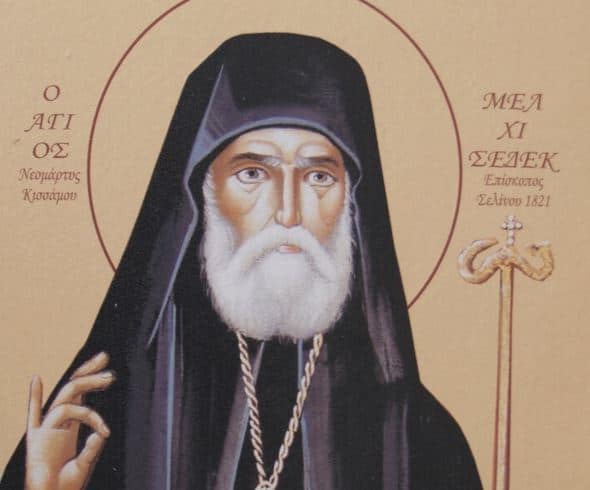May 19, 1821. Chania (Crete). Serif Pasha arrests the Bishop of Kissamos, Melchizedek Despotakis, on false charges. He hands over Melchizedek to the Turkish mob, who hang him and mutilate his body. The Turkish mob then attacks any Greek they could find in the streets.
Melchizedek Despotakis, originating from Heraklion in Crete, became a monk at a young age and went to the the city of Iasi, Romania for higher education as an apprentice near the teacher Kleovoulos. In January 1818 he was ordained bishop of the diocese of Kisamos and Selino and successor of Ioannikios. Being brave and with a thriving national morale, he had been introduced into the Revolutionary Organisation called “Filiki Eteria” (Friendly Company) by Pangalos Varnavas. He became leader of the revolution of 1821. He had a brave and fearless character and, as a bishop, he repelled many unjust demands of the Turkish Janissaries.
ARREST AND DEATH AS A MARTYR
In mid May 1821 the Turks in Chania, already knowing the moves of the bishop in the province of Selino once he returned to his diocese headquarters, which in those years was the village of Episkopi, Kissamos with the ancient cathedral church of Rotonda (Michael Archangellos) as the metropolitan church, went to the Turkish commander of Chania, Serif Pasha, and demanded the arrest and imprisonment of the bishop. The pasha, obeying the demands of the mob, ordered for the bishop to be arrested on the charge that "he toured his provinces, encouraging his people to revolt." They led him to the prisons of Chania to be imprisoned in the Fort Splantzia (Turkish district then) along with his deacon Kallinikos, from Veroia, who was hated by the Turks for his way of teaching and they sneeringly called him “Nizamzetitlin”. They arrested him in the village of Pervolia, in the house of Konstantinos Gerakakis.
The Turkish mob, with shouts and uproar, demanded that the bishop and his deacon be delivered into their hands. The pasha gave permission and from that point on, we rely on eyewitnesses to give us the true account of what happened.
“They hanged the bishop after having humiliated him by dragging him around the streets of Chania naked, mocking him, plucking the hairs from his beard and hitting him on the head. After hanging him, they took off his eyes and mutilated his holy body. They did the same to his deacon Kallinikos” wrote Cretan members of “Filiki Eteria” to the people of Ydra on 25 May 1821.
There are some notes kept at the French Embassy of Chania which report that the bishop’s last words to his tormentors were: “Eat my flesh, you beasts, but the spirit that I now hand over to my maker you cannot hurt. I firmly hope that God will punish you very soon for you have so unfairly shed the blood of Christians.”
Bishop Melchizedek of Kisamos and his deacon Kallinikos were hanged "with despicable insolence" on a plain tree in the Square of Splantzia in Chania on May 19 1821. It was the day when Christians celebrated the Ascension of the Lord. There, several years ago, was erected a commemorative plaque which reads: "ON 19 MAY 1821 THE TURKS HANGED ON THIS PLAIN TREE THE BISHOP MELCHIZEDEK AND KALLINIKOS, THE DEACON FROM VEROIA. MAY THE MEMORY OF THESE MARTYRS BE ETERNAL."
On 21 September 2000, the Ecumenical Patriarchate officially acknowledged Bishop Melchizedek, as well as all the other clerics who became martyrs during the years 1821 – 1822 as Saints.

